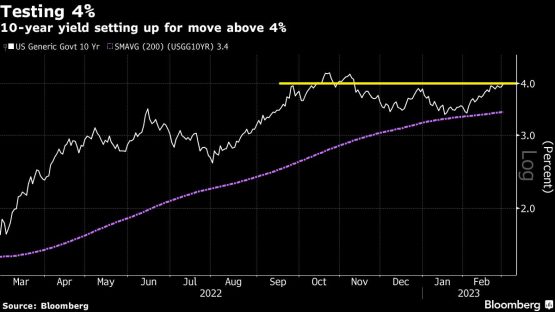A gauge of Asian stocks dipped, led by declines in Hong Kong-listed technology shares, and US equity futures extended their declines as traders continued to digest more hawkish comments by Federal Reserve officials.
The drop in Asian stocks clawed back some of the sharp moves higher in Chinese equities earlier this week and came after the S&P 500 closed near the lowest in six weeks and as the 10-year Treasury yield pierced the closely-watched 4% level.
Swaps markets are now pricing in a peak US policy rate of 5.5% in September, with some traders betting it may reach 6%. That’s spilling over into markets around the world, even as China’s economy shows signs of rebounding strongly after exiting its Covid-zero policy.
“The good news out of China is what the market has really needed at this point where globally we are seeing these inflation concerns not dying out,” Charu Chanana, senior markets strategist at Saxo Capital Markets, said on Bloomberg Television.
Yet she warned that this good news has a negative side in terms of global inflation: “The China reopening story adds cyclical upside pressure because of the sheer amount of demand that China can create.”
Yields on Australian and New Zealand government bonds advanced across the 2-year to 10-year maturities in moves that largely tracked Treasuries. The 10-year Treasury remained just above 4% during Asian trading.
The dollar rose against its Group-of-10 counterparts after a gauge of greenback strength dropped 0.5% on Wednesday, the most in a month.
The offshore yuan weakened after being one of the most notable gainers versus the dollar Wednesday, when it rallied more than 1% in its largest advance since November.
The trigger for higher yields was Fed officials on Wednesday reinforcing their hawkish stance. Atlanta Fed’s Raphael Bostic called for continued rate hikes to above 5% to make sure inflation doesn’t pick up again. Minneapolis Fed President Neel Kashkari, meanwhile, said he’s concerned that there isn’t much of an indication that the central bank’s rate hikes are slowing down the services sector.
At above 4% yield, the 10-year Treasury undoubtedly offers a good income although the shorter-end of the curve would be a better investment choice during the current environment. according to Isaac Poole, global chief investment officer of Oreana Financial Services.
“But really what this is a statement on is the shape of the yield curve. It is so deeply inverted. There’s going to be a steepening here,” he said on Bloomberg Television. “That’s the big trade we think over the next 12 months.”
Oil steadied, but remained set for a third day of gains on optimism over a revival in Chinese demand. Gold slipped.
Key events this week:
- Eurozone CPI, unemployment, Thursday
- US initial jobless claims, Thursday
- Eurozone S&P Global Eurozone Services PMI, PPI, Friday
Some of the main moves in markets:
Stocks
- S&P 500 futures fell 0.4% as of 1:51 p.m. Tokyo time. The S&P 500 fell 0.5% lower
- Nasdaq 100 futures fell 0.5%. The Nasdaq 100 fell 0.9%
- Japan’s Topix index fell 0.2%
- South Korea’s Kospi index rose 0.9%
- Hong Kong’s Hang Seng Index fell 0.4%
- China’s Shanghai Composite Index rose 0.2%
- Australia’s S&P/ASX 200 Index was little changed
Currencies
- The Bloomberg Dollar Spot Index rose 0.1%
- The euro fell 0.2% to $1.0649
- The Japanese yen fell 0.2% to 136.43 per dollar
- The offshore yuan fell 0.3% to 6.9020 per dollar
Cryptocurrencies
- Bitcoin fell 0.1% to $23,523.43
- Ether fell 0.4% to $1,650.2
Bonds
- The yield on 10-year Treasuries advanced two basis points to 4.01%
- Australia’s 10-year yield advanced six basis points to 3.84%
Commodities
- West Texas Intermediate crude was little changed
- Spot gold fell 0.1% to $1 834.25 an ounce
© 2023 Bloomberg

